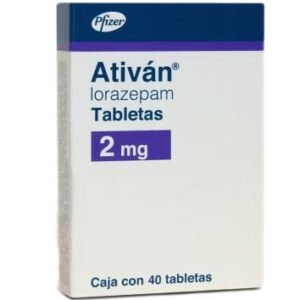Description
Ativan 1mg, a widely prescribed brand name for the drug Lorazepam, is a potent benzodiazepine used to treat a variety of conditions involving the central nervous system. It is primarily prescribed for the management of anxiety disorders, short-term relief of acute anxiety symptoms, and treatment of insomnia, as well as for preoperative sedation and seizure control. Lorazepam belongs to a class of medications that act as central nervous system depressants, delivering calming effects by enhancing certain brain chemicals.
Mechanism of Action
Ativan 1mg works by increasing the activity of gamma-aminobutyric acid (GABA)—a natural chemical in the brain that helps regulate excitability. GABA acts as an inhibitory neurotransmitter, calming brain activity. By enhancing GABA’s binding to its receptors, Lorazepam produces anxiolytic (anti-anxiety), sedative, anticonvulsant, muscle-relaxant, and amnesic effects.
Medical Uses of Ativan 1mg
Doctors prescribe Ativan 1mg for the following conditions:
-
Generalized Anxiety Disorder (GAD)
-
Panic attacks and acute anxiety episodes
-
Insomnia, especially when linked to anxiety or stress
-
Status epilepticus (as part of emergency seizure treatment)
-
Pre-surgical sedation and anxiety reduction
-
Alcohol withdrawal symptoms such as agitation and tremors
-
Nausea and vomiting associated with chemotherapy (as adjunct therapy)
Dosage and Administration
Ativan 1mg tablets are taken orally, with or without food. The typical adult dosage for anxiety ranges from 1mg to 3mg per day, divided into 2–3 doses. For sleep disturbances, a single 1mg dose may be taken at bedtime. In elderly or debilitated patients, a lower initial dose is generally recommended due to increased sensitivity to benzodiazepines.
Because Ativan has a medium duration of action, it is effective in treating both sudden episodes of anxiety and ongoing symptoms. However, it is typically prescribed for short-term use (2 to 4 weeks) to reduce the risk of tolerance, dependence, and withdrawal.
Side Effects of Ativan 1mg
Common side effects include:
-
Drowsiness or fatigue
-
Dizziness
-
Poor coordination
-
Weakness
-
Blurred vision
-
Nausea
Serious (less common) side effects include:
-
Respiratory depression (especially when combined with opioids or alcohol)
-
Confusion, memory issues, or hallucinations
-
Mood changes like agitation or depression
-
Physical or psychological dependence with prolonged use
Warnings and Precautions
-
Habit-forming: Ativan 1mg can cause dependence if used for extended periods. It should never be stopped abruptly; tapering is advised under medical supervision.
-
Avoid alcohol or other sedatives while using Ativan, as this combination can lead to life-threatening respiratory depression.
-
Pregnancy and breastfeeding: Lorazepam can harm the fetus or pass through breast milk. It is not recommended unless absolutely necessary and prescribed by a doctor.
-
Elderly patients are more likely to experience side effects such as confusion, drowsiness, and increased fall risk.
Conclusion
Ativan 1mg is a trusted and effective short-term medication for anxiety, sleep disturbances, and several other conditions requiring CNS sedation. Its fast-acting formula makes it especially useful in managing acute symptoms. However, due to its potential for tolerance, dependence, and withdrawal, it should only be used under proper medical guidance. Always follow your physician’s advice when starting, continuing, or stopping Ativan 1mg to ensure safe and effective treatment.



Reviews
There are no reviews yet.